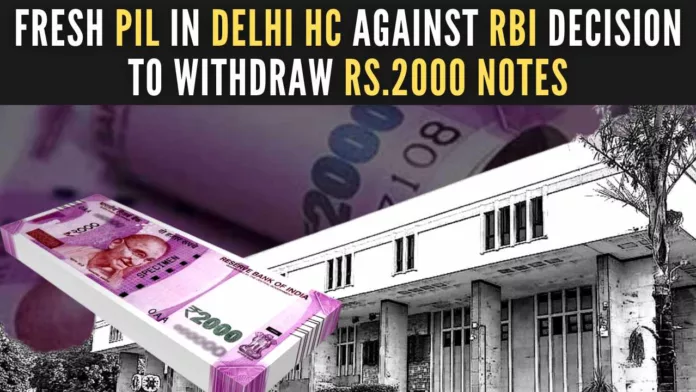
Another PIL in Delhi HC against the withdrawal of Rs.2000 note
A fresh Public Interest Litigation (PIL) has been filed in the Delhi High Court challenging the recent decision of the Reserve Bank of India (RBI) to withdraw Rs.2000 notes from circulation. The PIL argues that the RBI lacks the independent authority, as per the Reserve Bank of India Act, to make such a decision.
Furthermore, it contends that the withdrawal of the banknotes after 4-5 years, with a specific deadline, is deemed “unjust, arbitrary, and contrary to public policy”.
In the PIL, lawyer Rajneesh Bhaskar Gupta said: “It is respectfully submitted that the RBI, as Respondent no 1, does not possess independent power under the Reserve Bank of India Act, 1934, to direct the non-issue or discontinuance of any denominational value banknotes. Such power is exclusively vested with the Central Government, as stated in section 24 (2) of the RBI Act, 1934.”
The PIL highlights that the circular in question fails to indicate that the decision to withdraw the banknotes has been made by the Central government.
It argues that the RBI has provided no explanation other than the “Clean Note Policy” for taking such a significant and arbitrary step of withdrawing the banknotes from circulation, without adequately considering the potential repercussions for the general public.
Referring to the provisions of the RBI’s clean note policy, the PIL points out that damaged, counterfeit, or soiled banknotes of any denomination are typically withdrawn from circulation and replaced with newly printed ones.
“However, in the present case, only the Rs.2000 denomination is being withdrawn within a specific deadline, without any indication of the RBI introducing a similar replacement banknote into circulation,” advocate Gupta further emphasized in the PIL.
The PIL raises concerns over the impact of withdrawing the Rs.2000 banknote, claiming that small vendors and shopkeepers have already ceased accepting it.
It further argues that the RBI has not provided any clarification regarding the benefits to either the RBI or the national economy from withdrawing the Rs.2000 denomination. The PIL also drew attention to the well-known hardships faced by citizens during the demonetization of Rs.500 and Rs.1000 notes in 2016.
“It is respectfully contended that the Rs.2000 denomination, printed in 2016 and thereafter, remains in excellent condition with robust security features and does not necessitate withdrawal from circulation, be it under the Clean Note Policy or any other grounds. Furthermore, the Clean Note Policy specifically mandates the withdrawal of damaged, counterfeit, or soiled banknotes, rather than the withdrawal of all intact banknotes,” Gupta states in the PIL.
The PIL also highlights that a significant amount of public funds have been utilized for printing the Rs.2000 notes, which will go to waste as a result of their withdrawal.
“It is respectfully argued that there is a possibility that the RBI’s challenged notification/ circular may induce anxious citizens to queue up at banks across the country during the hot weather of May, June, and July. This situation could lead to the loss of numerous lives, similar to the period of demonetization in 2016 when over 100 citizens lost their lives due to the incorrect policy decision of demonetizing Rs.1000 and Rs.500 notes by the Central Government. Now, a similar scenario is unfolding in the name of the RBI’s Clean Note Policy, despite the absence of any statutory authority,” Gupta argued.
[With Inputs from IANS]
PGurus is now on Telegram. Click here to join our channel and stay updated with all the latest news and views
For all the latest updates, download PGurus App.











The corruption and black money has been cultivated since independence by successive, governments. The eradication will be a slow process with multiple methods. The entrenched corrupts are mostly people with unlimited resources, well educated and capable of being steps ahead of the preventers.Unless the judiciary is willing to see though their game and delaying methods the battle will be even slower. The Demos have dealt a severe blow. For putting all the thieves behind bars, we will have to build new jails so the easier way will be confiscate the proceeds of crime swiftly.